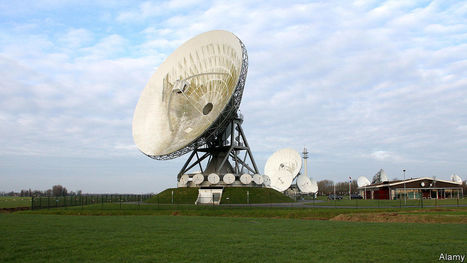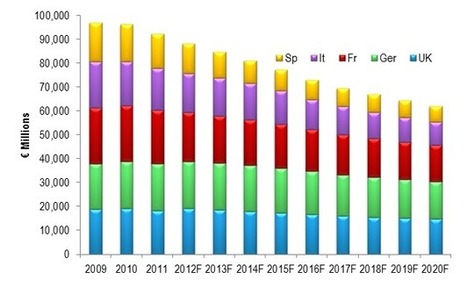 Your new post is loading...
 Your new post is loading...
A DANE, A Swede, a German and a Dutchman walk into a bar. It is 1979 and spooks from the four countries are conferring in Munich over dark and malty lagers. For years, they had co-operated in the business of signals intelligence, or SIGINT—intercepting messages and cracking codes—and wanted a name for their budding spy pact. “They looked at their glasses, filled with Doppelbock beer of the local brand Maximator,” writes Bart Jacobs, a Dutch computer-science professor, “and reached a decision”. In a paper published last month, Mr Jacobs publicly revealed the existence of the Maximator alliance for the first time, to the considerable irritation of those who had kept it under wraps for decades. The group was formed in 1976, when Denmark joined forces with Germany and Sweden to intercept and decipher messages sent by satellites, a burgeoning method of communication. The Netherlands joined two years later, bringing its intercept stations in the Carribean to the table, and France in 1985. The group is alive and well today. Maximator’s history is a fine illustration of the layers of chicanery involved in good cryptology. As well as plucking signals out of the ether, the group would swap details of weaknesses in cipher machines which encrypted diplomatic and military messages. Luckily for them, says Mr Jacobs, the companies that made those machines “were mostly controlled by Western intelligence organisations.” Crypto AG, a Swiss firm that dominated the global market, turns out to have been jointly owned by the CIA and its German counterpart, the BND. They would sell rigged machines to friends and enemies alike, including several NATO countries.
It’s hard not to get excited when people start talking about flying cars — after all, who doesn’t want a flying Jetsons car? When 2016 Hello Tomorrow Challenge grand prize winner, Lilium Jet, got on stage to present the world’s first vertical takeoff and landing (VTOL) personal aircraft, the audience was captivated. Before us was an image of a futuristic egg-shaped personal jet, majestically soaring above the glistening ocean.
Incubated under the auspices of the European Space Agency’s business incubation center in Bavaria, the young team of German engineers and doctoral students from the Technical University of Munich has a lofty ambition: to disrupt the future of everyday commute.
With Lilium Jet, people can move to rural areas while working in big cities, because long distances can be covered in a fraction of the traditional time.
Instead of queueing at an airport to go from Munich to Milan, you stroll into your garden, hop onto your Lilium, and take off; we’re talking about a garden of at least 15 x 15 meter. With electric engines, the Lilium is both quieter and more environmentally-friendly than helicopters. Classified as a light sport aircraft for two occupants, the Lilium can fly up to 300 km per hour, and requires only 20–30 hours of training as opposed to the costly, time-intensive training required to fly helicopters. Same as getting a driver’s license.
The world is still waiting for the year of Linux on the desktop, but in 2003 it looked as if that goal was within reach. Back then, the city of Munich announced plans to switch from Microsoft technology to Linux on 14,000 PCs belonging to the city's municipal government. While the schemesuffered delays, it was completed in December 2013. There's only been one small problem: users aren't happy with the software, and the government isn't happy with the price. The switch was motivated by a desire to reduce licensing costs and end the city's dependence on a single company. City of Munich PCs were running Windows NT 4, and the end of support for that operating system meant that it was going to incur significant licensing costs to upgrade. In response, the plan was to migrate to OpenOffice and Debian Linux. Later, the plan was updated to use LibreOffice and Ubuntu. German media is reporting that the city is now considering a switch back to Microsoft in response to these complaints. The city is putting together an independent expert group to look at the problem, and if that group recommends using Microsoft software, Deputy Mayor Josef Schmid of the CSU party says that a switch back isn't impossible. Schmid describes two major problems. The first is the issue of compatibility; users in the rest of Germany that use other (Microsoft) software have had trouble with the files generated by Munich's open source applications. The second is price, with Schmid saying that the city now has the impression that "Linux is very expensive" due to custom programming. Schmid also appears to be an Outlook fan, bemoaning the loss of a single application to crosslink mail, contacts, and appointments.
A German electronics company called Txtr has unveiled the Beagle, what is almost certainly the cheapest (if not the tiniest) E-Ink reader in the world. The Beagle weighs just 4.5 ounces; has a small 5-inch Electronic Ink screen; and costs just -- are you ready for this? -- 10 Euros, or about $13 U.S.
Alvarion demonstrates ultra-dense small cell platform to push towards gigabit networks at affordable cost
|
Operating independently for the first time since Chandrayaan-2was launched on July 22, Vikram, the lander, underwent its first manoeuvre around Moon.
Isro successfully completed the first de-orbiting manoeuvre at 8.50 am Tuesday, using for the first time, the propulsion systems on Vikram. All these days all operations were carried out by systems on the orbiter, from which Vikram, carrying Pragyan (rover) inside it, separated from on Monday.
"The duration of the maneuver was 4 seconds. The orbit of Vikram is 104kmX128 km, the Chandrayaan-2 orbiter continues to orbit Moon in the existing orbit and both the orbiter and lander are healthy," Isro said.
The next de-orbiting maneuver is scheduled on September 04 between 3.30 am and 4.30 am.
As reported by TOI, the landing module (Vikram and Pragyan) successfully separated from the orbiter at 1.15 pm Monday (September 2), pushing India's Chandrayaan-2 mission into the last and most crucial leg: Moon landing.
"The operation was great in the sense that we were able to separate the lander and rover from the orbiter—It is the first time in the history of Isro that we've separated two modules in space. This was very critical and we did it very meticulously," Isro chairman K Sivan told TOI soon after the separation.
It’s been almost three years since former FCC Chairman Julius Genachowski set a goal of having at least one gigabit network in every state by 2015. The year is now over and by Telecompetitor’s tally, we didn’t quite make it – but we’re close. We combed through our archives and other online resources and, by our tally, at least one network operator has announced plans to offer gigabit service in every state. Not all of these networks are actually deployed or supporting service yet. But generally network operators don’t announce specific markets more than a year or two in advance of when they expect to deliver service. If, for example, a network operator simply said it would eventually upgrade its entire footprint beginning in 2016, as Cox Communications did, we didn’t count the company’s entire footprint, only the states it provided more details on. We also didn’t count a deployment unless plans included residential users. Clearly Genachowski wasn’t talking about gigabit Ethernet service to commercial buildings when he set the gigabit goal. Gigabit States Even heavily rural states – states such as Wyoming, West Virginia, or Maine – made the list, thanks to a wide range of small locally-focused telcos, utilities, municipal network operators, and others. Even though deployment costs tend to be higher in rural areas, entities with a local focus often manage to find a way to make gigabit happen – and in the telco arena, many companies already had fiber-to-the-home networks, making it relatively easy to upgrade to a gigabit. Another thing that helped put all 50 states on the gigabit map was that tier one or tier two telco and cable operators that had not previously announced gigabit plans decided to get in on the trend. On the cable side, Comcast in 2015 launched an FTTH-based 2 gigabit service dubbed Gigabit Pro in several states – albeit in limited parts of each market. Smaller cablecos such as Cable One, Suddenlink, Mediacom and Troy Cable also made gigabit plans. And we’re likely to see a lot more from the cable companies in 2016 as they begin to deploy DOCSIS 3.1, which supports gigabit speeds.
Fred Destin has had a big 24 hours. The tech investor said Wednesday he would jump firms, from Atlas Venture in the U.S. to Accel Partners' London office. On Thursday morning, one of his leading investments for Atlas, UK-property listing site Zoopla, announced it would go public.
New analysis by the Telco 2.0 team shows that the mobile industry’s combined revenues from voice, messaging and data services in the EU5 economies (UK, France, Germany, Spain and Italy) will drop by nearly 20Bn Euros, or 4% per year, in the next...
The EU-funded EARTH Project has received the 2012 "Future Internet Award" prize for developing unprecedented energy efficiency solutions for mobile broadband networks. Researchers from companies including Alcatel-Lucent, Ericsson, Telecom Italia and NTT DOCOMO, plus universities in Belgium, France, Finland, Germany, Hungary, Italy, Portugal, Spain, Sweden and UK, have optimised the energy use of LTE base stations which account for the highest energy consumption in the mobile network. The initiative, which runs until June 2012, received EUR10 million of its nearly EUR15 million costs from the EU. Commercial products are expected from 2014.
|



 Your new post is loading...
Your new post is loading...















There is a European Five Eyes Raven and it is named after a German Beer